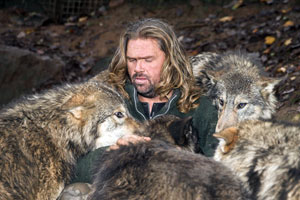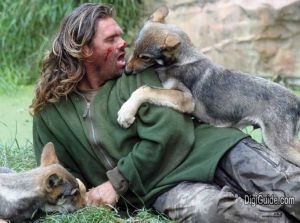Home » Literature Archives » Shaun Ellis: A Man Among Wolves
Shaun Ellis: A Man Among Wolves
by Yin Cai Shakya
I took the one less traveled by,
And that has made all the difference."
-- Robert Frost, The Road Not Taken
American literature is filled with stories of adventurers who turn away from the ordinary life of civilized society to experience life in the wild. Mark Twain gave us Tom Sawyer, the lad who yearned - and eventually managed - to escape his Aunt Sally's "civilisin" to venture into Indian Territory. J. Fenimore Cooper wrote about Natty Bumppo, known also as the Pathfinder, Hawkeye, and the Deerslayer, often portrayed in film - the latest being by Daniel Day-Lewis. Tom and Natty tempt us to swap our computer controlled existence for the free rigors of the wilderness.
Especially when we're on our way to work and find ourselves stuck in traffic, we feel a gnawing dread of having to enter, yet again, our monotonously safe, familiar, glass-and-steel world; and we'd give a lot to exchange that "dread of the known" for a little of the "fear of the unknown."
Civilization, we think, has pampered us into spectator slavery. We recall the Pathfinder's self-reliance and long for the freedom to participate in our own survival. Despite the inspiration, most of us don't get beyond the county line. Our static state, that of immoveable objects balanced by irresistible forces, is only rarely disturbed by an outside force. But when it is, and we are receptive to it, we act by compulsion, by obsession, by divine fiat. We may not know where our new path will take us, but we do not let anything stand in our way. On the other hand, to refuse to yield, obstinately to resist that voice that orders us, as Joseph Campbell often said, "to follow our bliss," is to condemn ourselves to a life that is devoid of satisfaction and a sustaining sense of purpose.
It's difficult to explain a man's choice to "take the road less traveled" especially when that road is one of self-denial and dedication to a cause that is not easily understood. In the religious life we speak of the decision to freely give our time and energies in service to others as "receiving the Call." In England, at the Combe Martin Wildlife Park, Shaun Ellis got the Call to minister to three abandoned wolf cubs. Answering it would mean leaving his family, friends, and the security of weekly paychecks to live full time in a camping vehicle parked beside a small fenced-in "wilderness." It would mean a 24/7 commitment and a life of hardship. Maybe only a cleric can understand that wisely Shaun Ellis decided that he had no choice. He answered the Call.
To him, the task consisted in more than simply saving the pups' life. Ellis was determined to prepare them to survive in the wild, and to do that he had to live with them as a functioning pack member. He became A Man Among Wolves, the title of a National Geographic documentary which chronicled his experiences. http://channel.nationalgeographic.com/series/inside/2926/Photos#tab-Overview
His little wolf pack consisted of four members: he, as Alpha male, and the three timber wolf pups named Yana, Tamaska, and Matsi, all males. Though he had no academic credentials, he was eminently qualified for the job.
Ellis had developed his interest in forest animals as a kid in England. He'd go out at night to study the habits of red foxes and badgers. As he approached adulthood, he trained to become a game warden; but he lost his job when it was discovered that he planned to release animals that had been, in his opinion, unfairly culled. The independent rebel in him was already evident.
He then spent a few years in the Royal Marines, receiving valuable survival and special services training. After completing his tour of duty, he resumed his independent study of foxes, coyotes, and wolves. At one seminar he chanced to meet a Native American biologist who invited him to live among the Nez Perce and study at a Wolf Research Center on their reservation in northern Idaho. Ellis went to Idaho and stayed for seven years. For the first five years he acquired much of the Native American knowledge of the wolf, learning the meaning of their various howls, facial expressions, growls, whines, body positions, and gestures. To know first-hand - rather than merely observe - the complexities of wolf hierarchy and the pack's social dynamics, he lived alone for two years among a wolf pack in the wild. His experiences proved to him that the wolf was far more intelligent than had been thought and that the animal's social organization was orderly, efficient, and benign within its instinctual perimeters.
Back in England, married with children, he founded Wolf Pack Management at the Combe Martin Wildlife Park. His mission: to rescue wolves that had been kept in captivity. Inevitably, his devotion to the wolves created a strain on his family life and his marriage failed.
Animals raised in captivity do not usually acquire the natural instruction they need in order to "mother" their offspring. One of the rescued females gave birth to three pups - and not knowing what to do about this strange event, she immediately abandoned them. Ellis accepted the responsibility to care for them himself, a decision which marked the beginning of an adventure that National Geographic would film. He named the pups Yana, Matsi, and Tamaska.
Under such conditions, the observer always affects the observed. Ellis knew that the pups would regard him as the "human" Alpha Male, and he did not want them to copy human behavior. He decided to live like an Alpha wolf and to engage and guide their natural instincts by teaching them the wolf-ways he had learned in Idaho
And so he packed his belongings, remnants of his life among the rest of us, and put them in the camper, which he parked beside the wolf enclosure at the wildlife park. He retired there, for only a few hours each day, to record the data he had collected. He wore an old army field jacket which he never changed or washed so that the pups would immediately recognize him by his scent. The rest of his time was spent with his pack. Soon the pups were ready to eat solid food.
When eating, wolves follow a strict protocol. The animals hunt as a pack, and "the kill", either in situ or dragged to the den, is eaten according to inviolable rules: the Alpha male eats first - getting the choice parts - the liver, being the most desired. The Alpha male allows his Beta wolf, in this case, Yana, to stand by, acting as the enforcer, the muscle, not unlike Channa, the Buddha's personal valet and body guard.
The "kill" was delivered to Ellis' camper. He'd remove its liver and fry it in the camper. Then he'd put the cooked liver into a plastic bag and insert it back into the animal's abdomen.
If Tamaska - a social-climber who would one day usurp Ellis - or Matsi tried to claim a portion of the meat before Ellis finished eating his, Yana adjudicated. And, wolves, being what they are, Yana would occasionally "test" Ellis, by moving closer to him as he ate. Ellis, constantly mindful of his pack, would keep Yana in line exactly the way that an Alpha wolf would: he bared his teeth and snarled. Amazingly, Yana would yield, lowering his head and indicating subservience by licking Ellis' mouth and chin.
Wolves mouth each other for a variety of reasons: to show subservience, to correct one another, and to indicate anger. Ellis has been nipped often enough to remain aware of the danger he faced if the wolves became too aggressive. Wolves do kill other wolves; and since they regarded him as just a peculiarly shaped wolf, he knew that it was possible, once the wolves had reached adolescence, that they could kill him. Interestingly, any cut that Ellis got was quickly tended by the wolves. They would lick his wound clean (as subordinate pack members do), and afterwards the wound would heal at an astonishing rate, accelerated by the antibiotic properties of wolf saliva. Though it didn't have the same curative effect, Ellis would mouth their wounds, too.
Ellis maintains that despite appearances, he was always in excellent physical condition and hadn't had so much as a cold throughout the entire eighteen months he lived with the wolves.
Life with the pups had its endearing moments. At a specific age pups must learn to howl; and as as the Alpha male, it fell to Ellis to teach them. In the Nat Geo documentary Ellis is shown howling as he holds Yana, the black pup. The pup stares up at him wondering what he is doing, but then the instinct kicks-in and Yana suddenly tilts his head back and imitates the howl. Then for a few minutes the two of them howl in perfect harmony.
Once the pups learned to howl, Ellis had to test them to determine whether or not his pack would howl when a situation called for it. Wolves have a repertoire of howls. A certain howl will cause the wolves to gather together; another will alert them to danger - an alien wolf may be encroaching on their territory. Their howl will then warn the interloper to back off.
To test his pack, he mounted two loudspeakers on the wall of the enclosure, and played a recording of a howling wolf pack. His own pack heard the recording and broke into a loud defensive howl. This was their territory and the alien wolves were warned.
Ellis reasons that it is precisely this kind of behavior that will allow humans to live in peace with with wolves. In many parts of the world, wolves encroach on farm and ranch lands and attack livestock.
In Poland, for example, the animal was once hunted, but strict conservation laws made it illegal to kill a wolf. As a consequence, the wolf population increased and the farmers were losing animals to wolf predation. When a Polish farmer contacted him, asking for help in solving his problem with wolves, Ellis accepted the challenge. He believed he had a solution.
Taking a sabbatical from the wild-life preserve and from his pack, he traveled to Poland and installed his wolf-howl audio equipment on the farmer's land. Periodically, the recording switched on to announce the territorial claims of his non-existent wolf pack. It worked. Three weeks passed without a single loss.
Ellis returned to his wolf pack to find that he had been replaced as Alpha male by Tamaska. Ellis was now a subservient member of the pack, a new role for him which he obediently followed.
Increasingly his work has gained respect in academic circles. One scientist, interviewed by National Geographic, appreciated the way that Ellis could "think outside the box."
Ellis is not a cockeyed optimist, and he isn't chasing a dream. His mission is to understand the wolf in such a way that will benefit both man and animal, and he pursues his mission with the zeal and the readiness to sacrifice that we more often see with clergy than with animal researchers. Ellis got the Call to serve, and he followed it with selfless devotion. He has gathered an astonishing wealth of knowledge about these mysterious animals, and he has converted this information directly into real-world solutions to troublesome problems.
We can't look at such a man and determine externally what he feels inside. To dedicate oneself to a cause that brings neither profit nor power is difficult to understand. What is not readily apparent is the inner satisfaction, the benediction, he has received that is of an order of magnitude many times greater than the triumphs of material ambition.
In Zen we know that there are many Calls to serve and that it is a mistake to regard one as being more or less difficult to respond to than another. We might hear an inner directive to achieve simplicity and think that this sounds like a summons we can either ignore or fulfill with ease. But it is a formidable objective. Shaun Ellis sacrificed family and the comforts of civilization to raise three abandoned wolf puppies. And in another time and in another place, he might have sacrificed as much to be able to say, in perfect sincerity, "How wonderful! How mysterious! I chop wood. I carry water."



